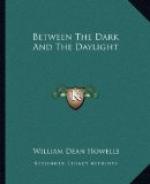“Don’t reduce it to the vulgarity of fiction. I admit it would be a selling name.”
“Go on, Wanhope,” Rulledge puffed impatiently. “Though I don’t see how there could be another soul in the universe as constitutionally scared of men as Braybridge is of women.”
“In the universe nothing is wasted, I suppose. Everything has its complement, its response. For every bashful man, there must be a bashful woman,” Wanhope returned.
“Or a bold one,” Minver suggested.
“No; the response must be in kind to be truly complemental. Through the sense of their reciprocal timidity they divine that they needn’t be afraid.”
“Oh! That’s the way you get out of it!”
“Well?” Rulledge urged.
“I’m afraid,” Wanhope modestly confessed, “that from this point I shall have to be largely conjectural. Welkin wasn’t able to be very definite, except as to moments, and he had his data almost altogether from his wife. Braybridge had told him overnight that he thought of going, and he had said he mustn’t think of it; but he supposed Braybridge had spoken of it to Mrs. Welkin, and he began by saying to his wife that he hoped she had refused to hear of Braybridge’s going. She said she hadn’t heard of it, but now she would refuse without hearing, and she didn’t give Braybridge any chance to protest. If people went in the middle of their week, what would become of other people? She was not going to have the equilibrium of her party disturbed, and that was all about it. Welkin thought it was odd that Braybridge didn’t insist; and he made a long story of it. But the grain of wheat in his bushel of chaff was that Miss Hazelwood seemed to be fascinated by Braybridge from the first. When Mrs. Welkin scared him into saying that he would stay his week out, the business practically was done. They went picnicking that day in each other’s charge; and after Braybridge left he wrote back to her, as Mrs. Welkin knew from the letters that passed through her hands, and—Well, their engagement has come out, and—” Wanhope paused, with an air that was at first indefinite, and then definitive.
“You don’t mean,” Rulledge burst out in a note of deep wrong, “that that’s all you know about it?”
“Yes, that’s all I know,” Wanhope confessed, as if somewhat surprised himself at the fact.
“Well!”
Wanhope tried to offer the only reparation in his power. “I can conjecture—we can all conjecture—”
He hesitated; then: “Well, go on with your conjecture,” Rulledge said, forgivingly.
“Why—” Wanhope began again; but at that moment a man who had been elected the year before, and then gone off on a long absence, put his head in between the dull-red hangings of the doorway. It was Halson, whom I did not know very well, but liked better than I knew. His eyes were dancing with what seemed the inextinguishable gayety of his temperament, rather than any present occasion, and his smile carried his little mustache well away from his handsome teeth. “Private?”




